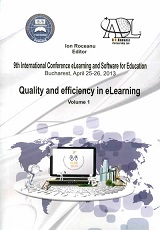POSSIBILITIES FOR THE DEVELOPMENT OF DIGITAL LITERACY OF THE JUNIOR GRADES STUDENTS OF PRIMARY SCHOOL
POSSIBILITIES FOR THE DEVELOPMENT OF DIGITAL LITERACY OF THE JUNIOR GRADES STUDENTS OF PRIMARY SCHOOL
Author(s): Gordana StepićSubject(s): Education
Published by: Carol I National Defence University Publishing House
Keywords: internet; digital literacy; digital competence
Summary/Abstract: Digital media are inevitable and inseparable part of our present and particularly the future. They largely define our ways of learning, working, communication and entertainment. Among other things, the ubiquity of Internet, the media which is constantly developing and introducing new functionality, has contributed to this. Internet is an integral part of lives of most children since early age. Children's use of Internet is diverse and variable. For children who grow up with digital media is often a priori considered to understand them, and know how to use them in a functional way. Contrary to this, there are empirical evidence that suggest that some students need more time and effort to learn the different aspects of digital literacy and it has increasingly been emphasized the importance and the need of parents', friends' and teachers' support in this field. The digital gap which is observed in terms of access to computers and Internet has decreased, but there are more evident differences in the pupils' ability of Internet use with increasing availability of digital media and their acceptance in education. There are two important questions which are imposed. The first one is what the role of education is in developing digital literacy and the second is role of digital literacy in the lives of young people. Defining digital literacy is the starting point for its measurement and giving support to students in its development. The main objective of this paper is to discuss the origin and the development of the concept of digital literacy. We tried to point out the structural elements of this concept and its relationship to other, similar concepts. We discuss, based on a review of relevant literature, the needs and opportunities of digital literacy in the lower grades of primary school.
Journal: Conference proceedings of »eLearning and Software for Education« (eLSE)
- Issue Year: 9/2013
- Issue No: 01
- Page Range: 368-375
- Page Count: 8
- Language: Dutch, Middle (ca. 1050-1350)

